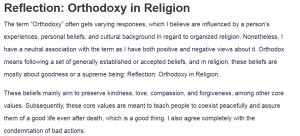Reflection: Orthodoxy in Religion
The term “Orthodoxy” often gets varying responses, which I believe are influenced by a person’s experiences, personal beliefs, and cultural background in regard to organized religion. Nonetheless, I have a neutral association with the term as I have both positive and negative views about it. Orthodox means following a set of generally established or accepted beliefs, and in religion, these beliefs are mostly about goodness or a supreme being: Reflection: Orthodoxy in Religion.
These beliefs mainly aim to preserve kindness, love, compassion, and forgiveness, among other core values. Subsequently, these core values are meant to teach people to coexist peacefully and assure them of a good life even after death, which is a good thing. I also agree completely with the condemnation of bad actions.
On the other hand, growing up in a generation that has taught me to be more open-minded and critical of everything, I also find this term exclusionary or intolerant and outdated. The beliefs here were set thousands of years ago, and since then, society has undergone many shifts that the orthodoxy disagrees with or condemns. This is especially true regarding things like gender equality, whereby most organized religious orthodoxy holds conservative or traditional roles of a man and woman.
“Orthodox tradition is marked by an overly sanctified patriarchy (in the leadership and lineage of exclusively male hierarchs), and the privileges patriarchal and androcentric priorities as universal- in ways that may significantly limit Orthodox Christianity inclusivity towards more diverse others” (Purpura 104). In addition, women are also expected to prioritize being wives and mothers and not embrace other roles like having careers, and men are made dominant over women.
Overall, I have a positive association with the term orthodoxy on the one hand and a negative one on the other. Orthodoxy is an excellent guide to living in a society that is kind to each other; however, it lacks adaptability to societal shifts, which can bring about conflict and discrimination and create a divide.
Works Cited
Purpura, Ashley. “Orthodox Gender Equality and the Challenge of a Sanctified Patriarchy.” Rethinking Gender in Orthodox Christianity (2023): 104.
ORDER A PLAGIARISM-FREE PAPER HERE
We’ll write everything from scratch
Question 
Orthodoxy
Religions rarely spring from the earth fully formed and, in this course, we see that to be the case with both Christianity and Islam, the two largest religions on earth. This can be an uncomfortable idea for religious devotees, and the process of adopting an official Orthodoxy, or a set of agreed upon texts, beliefs, and practices, within any religious group have often been bloody.

Reflection: Orthodoxy in Religion
At a time when fewer and fewer Americans (especially young Americans) are identifying as part of a religious group, I am curious to hear your reactions to the word, “Orthodoxy,” something that exists within all organized religions. Does this word have a positive, negative, or neutral association? Why do you think that is?